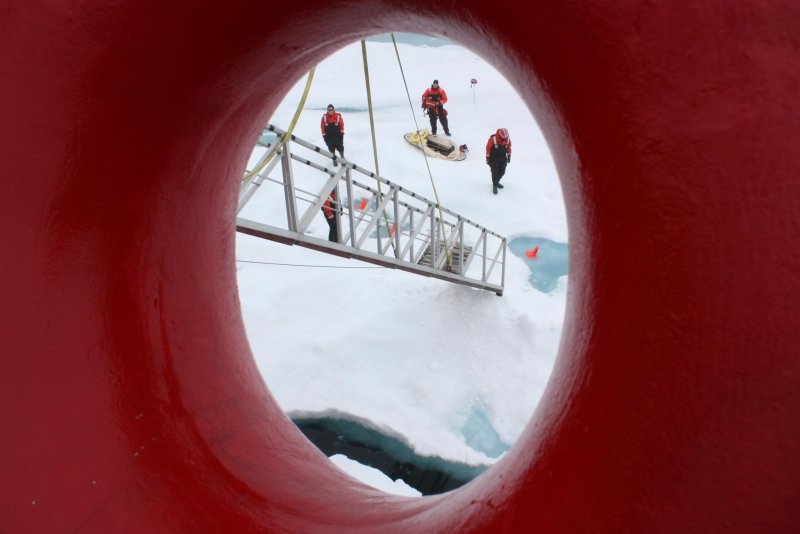A measure inserted in a bill meant to overhaul the U.S. tax code includes a provision to open up parts of a wilderness refuge area in Alaska to oil and gas drillers. File photo by Kathryn Hansen/NASA |
License Photo
Dec. 4 (UPI) -- As with the partisan divide, the stance on the U.S. tax overhaul was split evenly between oil and gas support and opposition from renewable and climate groups.
A $1.4 trillion, 479-page, tax reform bill passed along partisan lines early Saturday morning with Republican leaders in the Senate pushing the measure through with a 51-49 margin. No Democrats voted for the bill and Sen. Bob Corker, R-Tenn., was the lone "no" vote among the GOP. He said he voted against it because of deficit concerns after the non-partisan Congressional Budget Office estimated it would increase the deficit by about $1.4 trillion over the next 10 years.
Among other things, the bill contains a section drafted by U.S. Sen. Lisa Murkowski, R-Alaska, that would open up a section of the Arctic National Wildlife Refuge to oil and gas drillers.
"Opening the 1002 Area [in ANWR] and tax reform both stand on their own, but combining them into the same bill, and then successfully passing that bill, makes this a great day to be an Alaskan," she said in a statement after the measure passed.
Competing claims were made after the U.S. Senate passed a budget reconciliation proposal in November to open the 2,000-acre ANWR up to oil and gas drillers. The Arctic Slope Regional Corp., a title holder in the North Slope advocating for fossil fuels, pointed to an unspecified poll that showed a "clear majority" of those living in the region want responsible development.
The CBO estimated that implementing the legislation would bring about $1.1 billion in royalties to Alaska, while costing about $10 million for environmental reviews and administrative costs through 2022.
Advocacy group Earthjustice said Republicans in the Senate moved in stark contrast to constituents who seemed to be in favor of conservation over oil and gas interests.
"There is some Republican opposition in the House to including this poison pill in the final budget, and Earthjustice will fight hard to defeat this measure and preserve this treasured landscape for future generations," Earthjustice President Trip Van Noppen said in a statement.
Alaska's government in 2014 awarded oil and gas drilling licenses after clarifying authority near the border of the wildlife refuge.
Meanwhile, Sen. Joe Manchin, a West Virginia Democrat once considered a candidate for energy secretary under U.S. President Donald Trump, said he was in support of efforts to overhaul a complex tax code if it benefited the economy and raised wages, but the one that passed Saturday was a "rushed bill" that represented "nothing more than a sugar high with an old fashioned bait and switch."
The American Petroleum Institute, the oil and gas industry's main lobby group, said in a comment emailed to UPI that Senate leadership should be applauded for adopting pro-development reforms. By their metric, the decision to lower the corporate tax rate and add provisions for the oil and gas industry could lead to "billions of dollars" in investments and add "10 million" jobs to the U.S. economy.
A joint statement from six renewable energy and conservation groups said there were laudable provisions for the clean energy sector and the reduction in the corporate tax rate was a welcome step for business. On balance, however, they said there were provisions that would have a negative impact on clean energy investments that have been critical to growth.
"If these provisions are retained, they will result in broad instability and uncertainty for businesses and investors across many sectors, including the clean energy sector," they said.
President Trump has so far been a clear and vocal supporter of the oil and gas industry. House and Senate leaders still need to reconcile each version of their tax reform bills in committee before they hand anything over to the president for his signature.















